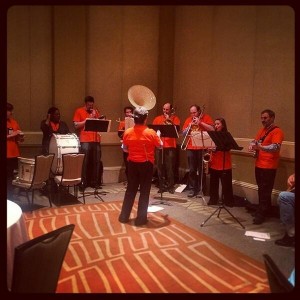 I attended the NERCOMP annual conference from 3/24 till 3/26. It is one of my favorite gatherings (Newly constituted NERCOMP band that you see in the image entertained us). This year, we had record attendance of 725. We had two highly entertaining keynotes – one by Jeff Borden from Pearson and the other by Bryan Alexander from NITLE. Jeff talked about the connection between neuroscience, learning design and educational technology and how we can learn from brain research and psychology and use the emerging technologies to deliver better learner experience. Through a simple exercise of asking us all to get up and stand on one leg with arms spread, he proved that a whole bunch of us were drunk at 10 AM. There may be some truth to it! You can see a conversation with Jeff here. Bryan laid out various trends in technology and higher education nicely and made it a point to remind the audience that predictions by humans generally are worse than those based on throwing of darts or, plain random predictions. You can see a conversation with him after his talk here.
I attended the NERCOMP annual conference from 3/24 till 3/26. It is one of my favorite gatherings (Newly constituted NERCOMP band that you see in the image entertained us). This year, we had record attendance of 725. We had two highly entertaining keynotes – one by Jeff Borden from Pearson and the other by Bryan Alexander from NITLE. Jeff talked about the connection between neuroscience, learning design and educational technology and how we can learn from brain research and psychology and use the emerging technologies to deliver better learner experience. Through a simple exercise of asking us all to get up and stand on one leg with arms spread, he proved that a whole bunch of us were drunk at 10 AM. There may be some truth to it! You can see a conversation with Jeff here. Bryan laid out various trends in technology and higher education nicely and made it a point to remind the audience that predictions by humans generally are worse than those based on throwing of darts or, plain random predictions. You can see a conversation with him after his talk here.
The big question in the minds of most of us in the audience is “This all sounds great and we are on board. But, whats next? How do we bring along the others such as the faculty, students and the administration to buy into all of this?”.
I sampled several very informative sessions. The session on flipping the classroom by Thomas Menella (Baypath College) was very good and you can access his presentation material here. If you are interested, please watch the Prezi presentation which provides in great detail what Thomas does for the class. It was funny to hear him describe how they have mock trials about DNA mutation. Students are grouped together – for, against and a jury – to decide whether the DNA is guilty or innocent of mutation (or at least that is how I understood it). I was not there for the student presentations, but based on the tweets that I saw, looks like they really learned a lot from this.
Of course, we all tweeted a lot and you can see them here. If you are interested seeing all of mine, click here.